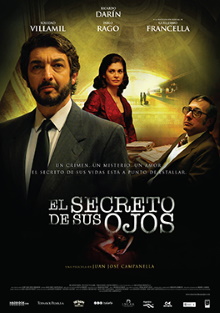A discussion on the more notable Argentinean films of the recent past led us to Nine Queens, which we of course loved. The other film is this one which was considered good enough to merit being adapted by Hollywood. This one also stars Ricardo Darín as the lead but is otherwise a very different film. Though it seems at first to be a crime thriller, it is actually a very romantic film. This combination is strange enough to intrigue me and it is a very emotionally intense film. I think however that while this film does capture some of the political conflict in Argentina the earlier film still better represents it.
Most of the story is recounted via flashback as Benjamin Esposito, retired from his job as a court clerk, tries to write a novel about the most notable case he has worked on. This was a horrific rape-murder case that took place twenty five years ago. Esposito was struck first by the beauty of the victim, Liliana, and then by the love her husband Pablo has for her. A rival prosecutor tries to pin the blame on a couple of construction workers and after foiling that, Esposito works on the case himself with the help of his alcoholic friend Sandoval. After looking at old photos of Liliana, he notices a man in many of them who seems to be staring at her. Pablo helps identify him as a friend from Liliana’s home town and Esposito becomes convinced that he is the murderer. He resorts to breaking the law and using unconventional means to catch the suspect. Meanwhile he is himself in love with his immediate superior Irene and doesn’t act on it as she is younger than him and he feels she is far out of his league.
There’s a lot more to this film than the above summary includes and I found myself being pleasantly surprised by the turns the plot takes. The natural inclination is to view it as a thriller about Esposito trying to bring a criminal to justice and indeed it is that with Esposito and Sandoval being at times not very competent investigators in tracking down the murderer. But the real theme is enduring love that survives time and even death. Esposito becomes so obsessed with the case himself only because he realizes that Pablo is still spending his spare time hanging out in train stations to watch for the murderer after the case has been closed. He himself is so obviously in love with Irene that everyone around him can see it and this love endures even as both get married to other people and Irene has children of her own and he retires from his job. As I noted, that makes it an intense film but I am leery of Esposito realizing who the murderer is just by noticing how he looks at Liliana in old photos and I dislike how it makes the character of Irene so passive. She does have a good scene when they try to elicit a confession out of the suspect but eventually she realizes herself that Esposito really is in love with her and keeps waiting anyway. It’s romantic, but only in a naïve, immature way.
The political backdrop against which the story takes place matters to some extent. After Esposito and Sandoval tracks the murderer down, he ends up getting an early release from prison due to his being willing to be used as a thug by the dictatorship which comes to power during that time. Then there’s how Irene doesn’t fear reprisals due to her powerful family connections but Esposito is vulnerable. This sense of needing to create your own justice is another theme of the film but it feels secondary to me. The film would have been stronger for me if it had leaned more in this direction, elaborating on how exactly the justice system in Argentina works and the difference in social status between Irene and Esposito. As it is, it provides an interesting context to what happens but doesn’t feel like a core component of the plot.
Compared to Nine Queens, The Secret in Their Eyes is grander in scope with some amazing set-piece scenes and is more emotionally affecting. It is in every respect a solidly good film that I would easily recommend and it’s easy to why Hollywood wanted to adapt it. Still I feel that Nine Queens is cleverer in how it really is about the country of Argentina as a whole rather than its main characters and that’s why I still like it more.
